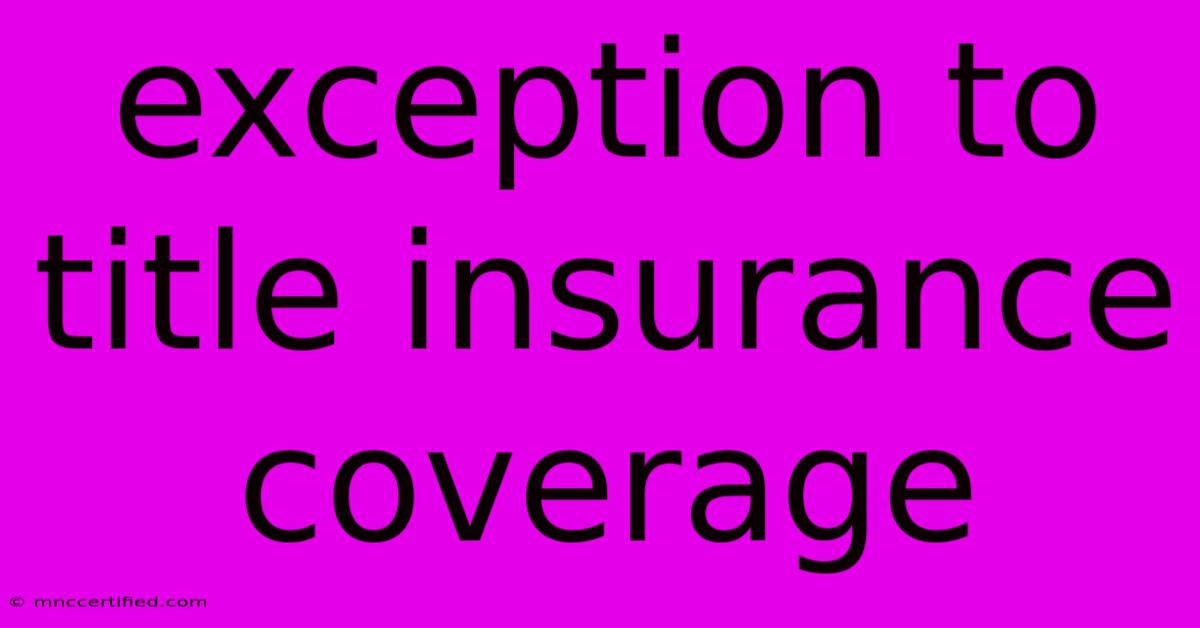Exception To Title Insurance Coverage

Table of Contents
Exceptions to Title Insurance Coverage: What You Need to Know
Title insurance is a crucial component of any real estate transaction, providing protection against unforeseen title defects that could jeopardize your ownership rights. While title insurance offers valuable peace of mind, it's important to understand that it doesn't cover every possible issue. This article explores common exceptions to title insurance coverage, helping you make informed decisions about your real estate investment.
What Does Title Insurance Cover?
Before diving into the exceptions, let's clarify what title insurance typically covers:
- Ownership Defects: Protects against claims from previous owners, liens, easements, or encumbrances that weren't properly recorded or disclosed.
- Forgeries and Fraud: Covers situations where the previous owner's signature was forged or the transaction involved fraudulent activities.
- Errors in Public Records: Safeguards against inaccuracies or omissions in public records that impact your ownership rights.
Key Exceptions to Title Insurance Coverage
While title insurance provides broad protection, certain situations are specifically excluded from coverage. Here are some common exceptions:
1. Matters Known to the Insured:
This exception refers to issues that were known to the buyer before purchasing the property. For instance, if you were aware of a pending lawsuit affecting the property during your due diligence, title insurance won't cover it.
Tip: Always conduct thorough due diligence before buying a property and consult with your real estate attorney to understand any potential risks.
2. Matters of Public Record:
Title insurance generally doesn't cover issues that are readily apparent in public records. This includes:
- Zoning violations: If a property violates local zoning regulations, title insurance won't cover any resulting penalties or legal disputes.
- Building code violations: Similarly, violations of building codes aren't covered by title insurance.
Tip: Ensure the property you're considering is compliant with all relevant zoning and building codes.
3. Encroachments:
While title insurance can cover encroachment disputes if they involve a title defect, it generally doesn't cover encroachments that are evident upon inspection. For example, if a neighbor's fence is clearly encroaching onto your property, title insurance likely won't cover the costs of removal.
Tip: Get a professional survey conducted to identify any potential encroachments before closing on a property.
4. Environmental Issues:
Title insurance usually excludes environmental problems like contamination or hazardous materials. This is because these issues are often difficult to detect without specialized testing.
Tip: Consider purchasing an environmental insurance policy or conducting an environmental assessment to protect yourself from potential environmental liabilities.
5. Unrecorded Easements:
If an easement wasn't properly recorded in public records, it may not be covered by title insurance. This includes implied easements, which are created through the actions of property owners over time.
Tip: Review the property's chain of title carefully and consult with an attorney to identify any potential unrecorded easements.
6. Boundary Line Disputes:
While title insurance may cover legal disputes related to boundary lines, it generally doesn't cover the costs of surveying or establishing the exact location of a property boundary.
Tip: Get a professional survey conducted before purchasing the property to establish clear boundaries and avoid future disputes.
Conclusion
While title insurance offers significant protection against title defects, it's essential to remember that it's not an all-encompassing solution. Understanding common exceptions to coverage allows you to make informed decisions, conduct thorough due diligence, and minimize potential risks associated with your real estate investment. Always consult with your real estate attorney and review the specific terms of your title insurance policy to ensure you are adequately protected.

Thank you for visiting our website wich cover about Exception To Title Insurance Coverage. We hope the information provided has been useful to you. Feel free to contact us if you have any questions or need further assistance. See you next time and dont miss to bookmark.
Featured Posts
-
Tony Todd Actor Voice And More
Nov 10, 2024
-
Emergency Dentist Tucson No Insurance
Nov 10, 2024
-
Aussie Insurance Leave In Conditioner
Nov 10, 2024
-
What If Insurance Estimate Is Too Low
Nov 10, 2024
-
Top Upsc Current Affairs October 28 November 3 2024
Nov 10, 2024